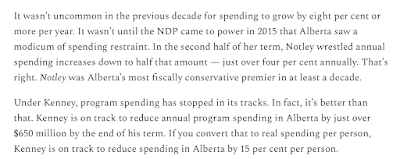So, according to Ken Boessenkool, we should congratulate Jason Kenney for "being on the right track".
I get it - Ken's a conservative organizer, and he's going to think that Klein's tenure was some kind of high point. It wasn't, and I think we all know that - we've spent that 15 odd years since Klein stepped down cleaning up the mess that he made. There's a whole lot more to good government than just "balancing" the fiscal books.
So, what does he think Kenney is winning on?
Ah yes ... the old conservative saw about "cutting spending". In Alberta politics especially, this is held as some kind truism. The government is always "wasting money", or "we're spending too much".
The logic usually goes something along the lines of "OMG, govt spending is increasing at a rate greater than inflation!" (or inflation plus population growth ... or whatever other axis you want to use). Therefore, the automatic assumption is that we are spending too much. The problem with this logic exists in multiple axis of consideration that our conservative friends almost never seem to address in their arguments.
For example, the most basic of business case analyses - cost / benefit - is almost never present. In pure business terms of course, cost/benefit analysis is purely a matter of $. If I spend $X on a project, and it comes back with $Y in revenue, is Y > X. (Yes - I'm simplifying here). We don't even get that far with government spending analysis done by conservatives.
When we talk about analyzing government programs, it's even more complex. The costs and benefits of any program may well not be easily measured. For example, lets look at what is commonly called welfare. It looks like a straight up cost sink. The government puts $X into the program, and gets nothing back out, right? Wrong. That $X put into the program has impacts all over the place. It reduces homelessness, it reduces petty crime (B&E, shoplifting, etc) because recipients are no longer desperate for the basic resources to survive, it reduces healthcare costs because mysteriously, people actually have the money needed to eat, so they aren't showing up at emergency with conditions exacerbated by malnutrition, etc.
The benefits of government spending are hard to quantify sometimes. That doesn't mean we shouldn't do so.
The value of a funded and functional healthcare system vastly outweighs the costs - even when it is a large proportion of the government's spending. People who aren't worried about whether they can afford to get sick or not are more willing to take economic chances - like starting a new business. Businesses benefit because suddenly they don't have to provide hugely expensive healthcare insurance plans for their staff (call that one an undeclared payroll tax). Large scale investment also looks at whether people are willing to move to a place - and healthcare is near the top of most people's agendas - for good reason. Likewise, a funded and functional education system is hugely important, and should not be used as a political football as Kenney has done in Alberta. The benefits vastly outweigh the costs, but those benefits are 20 years down the road.
Needless to say, I have never seen a conservative talk about these benefits in any kind of reasonable way, or what we may be giving up by focusing on "balanced budgets".
The other side of that same coin is the revenue picture. Alberta's revenue picture has been abysmal since before Klein. Our governments have insisted that a PST or HST is absolutely off the table, and there are frequent bragging sessions about having the lowest tax rates in the country. They paper the fiscal holes with one-time royalty dollars that should be flowing into the Heritage Savings Trust Fund. (Getty quit putting money in there in the 80s). Again, it's cheap populist politics in Alberta to say that raising taxes is unnecessary - just tighten the belt a bit further. Conservative politicians seem utterly oblivious to the fact that the revenue side of the picture also needs to be considered, and it is not reasonable to hold the line at unrealistically low tax rates.
So, will Mr. Kenney's polling fortunes improve on a wave of "good economic news"? Probably. But nobody should be fooled into thinking that he is in any way capable of, or willing to, understand the value of government spending.



